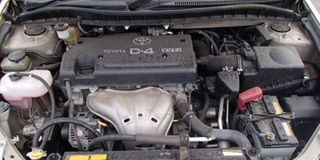How can I protect my engine?

Use genuine Toyota parts to get satisfactory results . FILE PHOTO
Hi Paul, I have a Toyota Premio with a petrol D4 engine but it stops running when it warms up as I drive. It will not start again, however, long I try to start it. However, when the engine cools down it starts with one kick. My mechanic has changed spark plugs and the air cleaner, as well as changed the oil. The problem persists and the “check engine” light shows every now and then. What is the problem?
Mugisha.
Mr Mugisha, your Toyota Premio seems to have a problem with one of the engine management system components or sensors. Your car type and those built after the 1990s have petrol engines whose fuel and spark delivery is controlled by an engine control module (ECM). This computer is regulated by different sensors on the engine which enable it to adapt to the different driving demands such as uphill driving, cold starting, warm starting and acceleration among others. Very often when the engine management system fails, the “check engine” light is displayed on your dashboard. You therefore need a computer diagnosis to point out the faulty component. In your case, subject to a diagnosis, the likely faulty part is the crank angle sensor (CKP) which reads the engine speed via the flywheel. The CKP works with other sensors such as the camshaft position, oxygen sensor and mass airflow sensor to regulate the ECM. The crank shaft position sensor which uses magnetic (hall effect) to read the flywheel speed will not work properly if its magnetism has deteriorated, especially as the engine warms up. Find a Toyota garage with a diagnostic computer to confirm the fault.
Hello Paul. I have a Toyota Vitz, 1999 model. I took it to one of the mechanics who opened the engine and it ended up knocking. I bought another used engine and replaced it. After how long should I replace the engine oil that I installed on 22/11/2014? What other precautions should I take to ensure that it lasts long?
Silver
Silver, an engine knock often results from mechanical damage inside the engine. This mechanical damage usually results from a poor lubrication system maintenance regime which leads to the damage of fast moving and very hot internal engine parts. Once in a while, an engine will knock because it has been repaired with substandard parts or mistakes made during assembling.
With regards to the used engine you recently bought, You ought to carry out a precautionary timing belt replacement in case its history or mileage exceeds the replacement interval of 100,000 kilometres.
This will prevent potential engine valve and piston damage in the event that the timing belt breaks. Toyota recommends engine oil which meets viscosity index 15W40. Shell provides the Helix HX5 which meets the viscosity requirement and gives you a 5,000 kilometre service or drain interval. Shell Helix HX5 is blended with additives which keep oil in suspension to prevent harmful sludge (semi solid lumpy) formation which blocks thin engine oil passages. Helix HX5 chemical additives will also prevent oxidation and corrosion as well as metal sheer damage. Use of good engine oil and periodical service with genuine Toyota filters will protect your engine. In case you park this car without use for more than six months it is recommended that you drain and replenish it with new oil as it ages with time even when you don’t drive the car.
I have got a Toyota Corona Premio ZZT240.
Year of manufacture 2003. It has one problem that seriously disturbs me. When I am driving at speeds in excess of 60km/hr and I press the brake with the intention of slowing down or maybe coming to a stop, the vehicle, especially the steering wheel shakes so vigorously. This is unnatural considering that I have been driving it for a number of years. What could be the problem?
Rodney
Hello Rodney, the steering judder or shaking may be caused by one of the following two factors: unevenly worn out brake discs or rotors and extremely worn out or loose suspension and steering linkage components. Brake disc rotors wear out due to age or the use of cheap counterfeit brake pads which are made of poor quality materials that damage the disc as you drive along. Uneven damage of the disc rotor surface due to intermittent thinning or warping around the rotor surface can cause juddering of brake pads when you apply the brakes at speeds of 50 kph or more. The effect of this judder maybe transmitted from the brake discs to the steering through the steering linkage or rack assembly. Get a good mechanic to inspect the condition of your brake disc rotors and confirm which ones may be the culprits. Front suspension components like ball joints, suspension plate bushes and upper control arms help to harness the wheel hub and axle to the car frame. When you brake a fast moving car, the dynamic forces will not be dampened by the damaged suspension parts. This may result in violent vibrations which may feel like a judder transmitted to the steering. The mechanic should inspect your front suspension components to confirm they are all intact.
Send sms: mycar (space) your comments and questions to 6933, or email them to [email protected]




